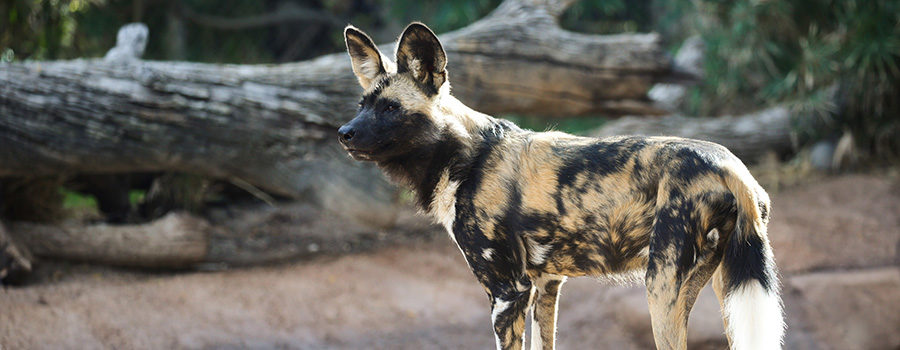African wild dogs, also called painted dogs, are members of the canid family and have mottled coats of yellow, black, and white. Each individual dog has a unique coat pattern that can be used to tell them apart. They are long-legged and slender with a relatively large tail that is often tipped in white. Unlike other canids, African wild dogs do not have dewclaws on their front feet and have coats that only consist of guard hairs with no undercoat. They also have large ears which are used for thermoregulation and provide an acute sense of hearing.
Diet: African wild dogs are opportunistic predators that will hunt a variety of small and medium-sized prey items but their preference is medium hoofed animals such as Thomson’s gazelle and impala. As cooperative hunters, they use vocalizations and body language to work as a team, resulting in a very high hunt success rate (60-90% of chases result in a kill compared to lions and hyenas which have closer to 25-30% success rates). African wild dogs can pursue prey over long distances at sustained speeds of 35 miles per hour (mph) and can sprint at up to 44 mph. African wild dogs can typically outlast their prey because of their long legs and large lung capacity. Although they are active during the day, hunting mostly occurs at dawn and dusk.
In the Wild: African wild dog packs average 7-15 individuals but can have up to 40. Each pack has an alpha male and female that are a monogamous breeding pair. All other pack members help to care for the alpha pair’s pups by regurgitating food and providing protection. Social bonds are maintained by touch, vocalizations, and other behaviors such as sneezing. Pack members will sneeze as a way to communicate group decisions, such as whether to start a hunt. A pack will take care of its weakest members, including those that are ill, elderly, or injured, and young pups. Older pups who are unable to participate in the hunt are allowed to eat at a kill first. Most male pups stay with their natal (birth) pack while female pups will often disperse in their second year. A new pack forms when a group of related dispersing females meets a group of males that are related to each other but not to the females.
Conservation issues/actions: Predators, like African wild dogs, are important in maintaining the natural balance in healthy habitats. Like most predators, African wild dogs need a lot of space to find what they need to survive. African wild dogs are one of the world’s most endangered mammals with habitat fragmentation due to human activities posing a major threat. As human activities reduce African wild dog habitat, resources in the area become limited, forcing wild dogs to live closer to people as they compete for food, water, and space. Additionally, living closer to humans increases the risk of disease; wild dogs can become infected with distemper and rabies from domestic dogs.
Natural threats include competition with lions and hyenas, and large carnivores preying on young pups.
Zoos and organizations around the world are working to increase African wild dog populations, both in the wild and in human care, and are working with local communities to balance the needs of people and African wild dogs. The health and survival of wildlife and wild places around the world are linked to our own survival – continuing to work together can protect us all.
At the Zoo:
Reid Park Zoo is home to four female African wild dogs. Social bonds are just as important for this family group as they are for the species in its natural habitat, so Reid Park Zoo provides large prey items and enrichment that the dogs can experience together.

